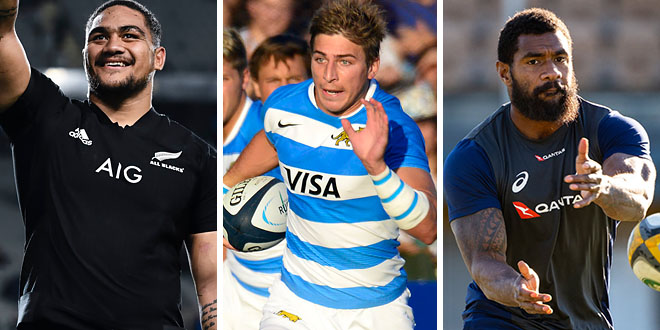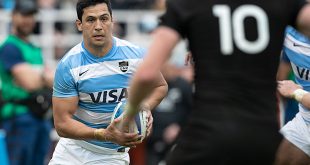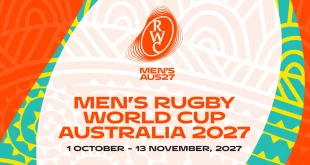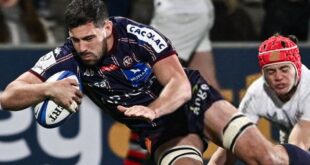The Rugby Championship is the name used for the Southern Hemisphere’s annual Tier 1 tournament. It is neither a regional nor a continental competition. Instead, it is the four RWC Semi Finalists outside of the UK and France. They happen to all be from south of the equator. South Africa’s decision to pull-out means the 2020 edition will be a Tri-Nations tournament.
The current article addresses the members of the competing teams representing Argentina, Australia, and New Zealand. It documents who are the Foreign-Born players, how they qualify and is they have prior affiliation to another union.
This article seeks to be fact providing. In search of objectivity, it sets out to be informative. This may (a) provide the reader with information of how players born outside of a country came to represent unions, and (b) the means to determine informed views on player eligibility.
Players obtain eligibility by meeting Regulation 8 as outlined by World Rugby. This can be achieved in one of three ways: (a) country of birth; (b) country where one parent or grandparent was born; or (c) complete 3 years of consecutive residency immediately before representative duty.
There were 130 Foreign-Born players at RWC 2015. The number increased to 144 for RWC 2019. In between the two tournaments World Rugby tightened the residency rule. It was extended by two years from three to five years residency. This was set to begin at the end of 2020, but World Rugby decided to extend it by twelve months, citing disruptions caused by the COVID-19 pandemic.
It must be clarified that the change from three to five years residency was motivated by the number of foreign-born adult players at RWC 2015 and the subsequent qualifying of additional adult players in 2016 and 2017.
Australia (13)
Australia’s Foreign-Born players are of two varieties. First, players who moved with their families at a young age. Second, players who were not developed primarily by Australian rugby. Filipo Daugunu, Marika Koroibete, Irae Simone, Taniela Tupou, and Suliasi Vunivalu were not developed primarily by Australian rugby. Koroibete and Vunivalu are eligible despite having played for Fiji at the Rugby League World Cup.
| PLAYER | POS | BIRTH COUNTRY | ELIGIBILITY | OTHER REP. |
| Brandon Paenga-Amosa | HK | New Zealand | Residency (2002) | – |
| Jordan Uelese | HK | New Zealand | Residency (2011) | – |
| Jermaine Ainsley | TH | New Zealand | Residency (2017) | – |
| Taniela Tupou | TH | Tonga | Residency (2017) | Tonga u15 |
| Lukhan Salakaia-Loto | LO | New Zealand | Residency (2002) | – |
| Liam Wright | FL | South Africa | Residency (2007) | – |
| Noah Lolesio | FH | New Zealand | Residency (2013) | – |
| Hunter Paisami | CE | Samoa | Residency (2018) | Samoa u20 |
| Irae Simone | CE | New Zealand | Residency (2017) | NZ Schools (RL) |
| Filipo Daugunu | WI | Fiji | Residency (2019) | Fiji u20 |
| Marika Koroibete | WI | Fiji | Residency (2015) | Fiji Bati (RL) |
| Suliasi Vunivalu | WI | Fiji | Residency (2017) | Fiji Bati (RL) |
| Dane Haylett-Petty | FB | South Africa | Residency (2003) | – |
New Zealand (6)
Two of New Zealand’s six players from abroad qualify via a parent. Akira Ioane was raised in New Zealand, while Tyrel Lomas was raised in Australia. The latter is the son of John Lomax, a former New Zealand rugby league captain who played professionally in Australia. The remaining four qualify via residency. Of them Sevu Reece moved to play rugby in New Zealand on a high school scholarship aged 17; and Shannon Frizell did so on an academy contract with the Tasman Makos. Ofa Tu’ungafasi moved to New Zealand aged 14. His father, Mofuike Tu’ungafasi, played for Tonga at RWC 1987.
| PLAYER | POS | BIRTH COUNTRY | ELIGIBILITY | OTHER REP. |
| Ofa Tu’ungafasi | LH | Tonga | Residency (2009) | – |
| Nepo Laulala | TH | Samoa | Residency (2007) | – |
| Tyrel Lomax | TH | Australia | Parent | Australia u20 |
| Shannon Frizell | FL | Tonga | Residency (2017) | Tonga u20, Tonga u17 Soccer |
| Akira Ioane | FL | Japan | Parent | – |
| Sevu Reece | WI | Fiji | Residency (2017) | – |
Argentina (1)
Sebastián Cancelliere was born abroad to Argentine parents. His mother was pregnant with him when arriving in San José, California. His father moved to the USA for work in 1993. The family returned to Argentina in 1994 when Sebastián Cancelliere was one year old. His older brother, Martín Cancelliere is on the Argentina XV roster for the South American 4 Nations. He was born in Buenos Aires.
| PLAYER | POS | BIRTH COUNTRY | ELIGIBILITY | OTHER REP. |
| Sebastián Cancelliere | WI | USA | Parent | – |
South Africa (-)
SA Rugby pulled-out of the 2020 Rugby Championship on October 16.
 Americas Rugby News Rugby news from across the Americas!
Americas Rugby News Rugby news from across the Americas!




